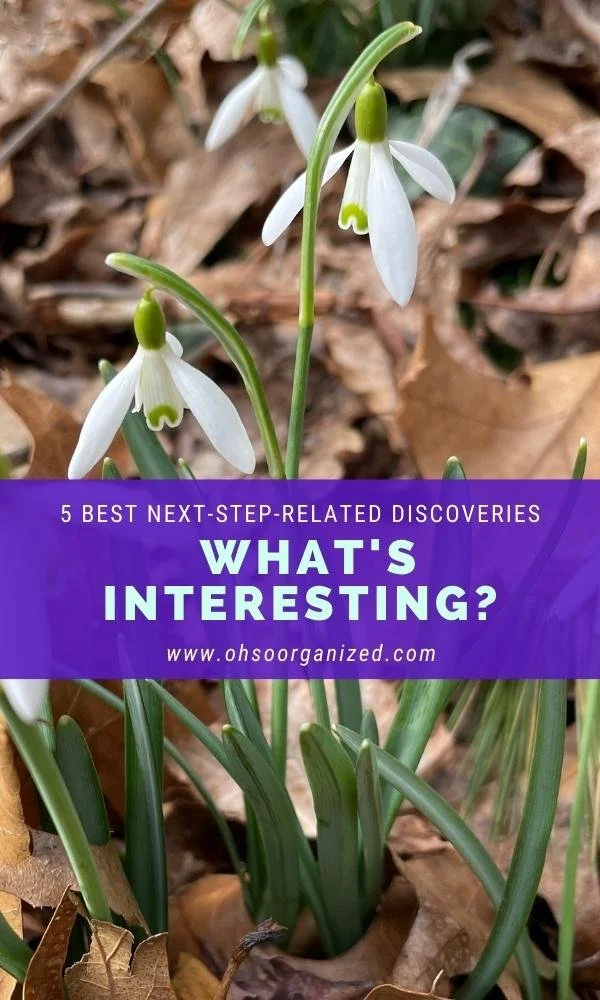The newest installment (v34) of the “What’s Interesting?” feature has my latest finds informing, educating, and relating to organizing and life balance. These are unique, inspiring, next-step-related discoveries that reflect this month’s blog theme.
You are a generous, communicative, and engaged group. I am deeply grateful for your presence, positive energy, and contributions to this community. I look forward to your participation and additions to the collection I’ve sourced.
What do you find interesting?
What’s Interesting? – 5 Best Next Step-Related Discoveries
1. Interesting Read – Positive Self-Talk Next
Is the voice in your head your biggest cheerleader or harshest critic? Does it guide you forward or prevent you from figuring out next? In Chatter – The Voice in Our Head, Why It Matters, and How to Harness It, psychologist Ethan Kross shares strategies based on behavioral and brain research. He helps us understand how to quiet the negative self-talk and create a positive internal conversation. Kross says, “…when the inner voice runs amok and chatter takes the mental microphone, our mind not only torments but paralyzes us.”
Kross provides a few dozen tools for “helping people resolve the tension between getting caught in negative thought spirals and thinking clearly and constructively.” They include engaging in mental time travel, changing the view, writing expressively, creating a board of advisors, seeking awe-inspiring experiences, and increasing exposure to green spaces.
One strategy that especially resonated with me is creating order in your environment. Helping clients get organized for almost 30 years, I’ve seen the positive benefits of calming the internal chatter when the external environment is organized. Kross says, “Find your own way of organizing your space to help provide you with a sense of mental order.”
2. Interesting Assessment – Get Unstuck Next
Let’s face it. Universally, we all get stuck at some point. It can be challenging to figure out the next step when that happens. Be stuck no more. I created this handy, custom-designed Get Unstuck Wheel, and you can spin your way forward. Discover the strategy that works best for you. There are 36 ideas to try, including taking deep breaths, sleeping on it, reaching out for support, and switching gears. What helps you get unstuck? Did you spin the wheel? If so, where did it land?
“Take the smallest, tiniest next step.”
3. Interesting Article – Perfectionism Insights Next
Do you or someone you know have perfectionist tendencies? If you want to struggle less, read Ashley Broadwater’s HuffPost article, “There Are 3 Types of Perfectionism. Which Category Are You?” Broadwater describes each type and some helpful coping strategies. Therapist Emily Simonian encourages her clients to focus on small, next steps. She said, “A perfectionist of any type will likely want a ‘big win’ quickly if trying to recover from perfectionism, but baby steps are key. … [Recovery] is very much attainable with practice.”
Self-oriented perfection – You expect the best from and are extremely hard on yourself. Practicing self-care and self-compassion can help.
Other-oriented perfectionism – You expect others to be a certain way and become upset when they don’t meet your expectations. Practicing gratitude and mindfulness is beneficial.
Socially prescribed perfectionism – You rely heavily on others’ thoughts about how you act or look and fear rejection. Strengthening your positive inner voice will help. This could be an excellent time to read Chatter (see #1 above.)
4. Interesting Season – Get Organized Next
As color returns to the landscape, daylight lasts longer, and temperature becomes warmer; this is an inspirational time of year. Spring is a wonderful season to set your organizing goals, declutter the extraneous, and create the calm you deserve. Change is possible, especially with support. Struggle no more. Enlist help from a compassionate and non-judgmental friend, family member, or professional organizer like me. I’m here to help. Discover the benefits of virtual organizing and why my clients love it so much. Call 914-271-5673, email me at linda@ohsoorganized.com, or click the “Let’s talk!” button to schedule a discovery call.
5. Interesting Thought – One Small Step Next
You want to declutter and organize your entire house, redo your filing and paper management systems, organize all of your photos and visual media, or change your organizing habits. However, these projects feel so large and overwhelming that you keep them as thoughts in your mind. No action gets taken because you feel stuck. It’s good to have the entire picture in your mind for what you want to achieve. However, you don’t have to know the whole plan. Take the smallest, tiniest next step. That is enough. Once that step is taken, acknowledge your progress and repeat the process. Continue taking action one little step at a time.
What are your interesting, next step discoveries? Which of these resonate with you? I’d love to hear your thoughts. I invite you to join the conversation.

















